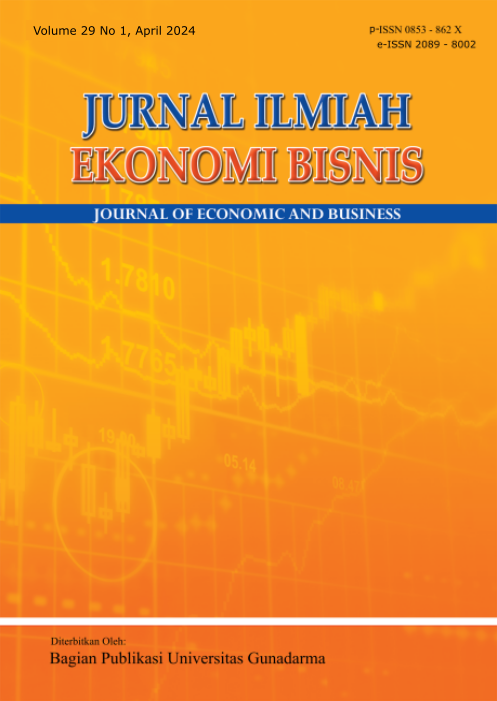DETERMINAN NIAT MENGGUNAKAN DOMPET ELEKTRONIK (STUDI PADA USIA DEWASA PENGGUNA DOMPET ELEKTRONIK DI INDONESIA)
Universitas Gunadarma
Indonesia
Universitas Gunadarma
Indonesia
Universitas Gunadarma
Indonesia
Abstract
Penelitian ini bertujuan untuk menguji dan menganalisis persepsi manfaat (perceived usefulness), persepsi kemudahan (perceived ease of use), persepsi risiko (perceived risk), dan kepercayaan (trust) terhadap niat menggunakan (intention to use) dompet elektronik. Sampel yang diambil dengan menggunakan metode purposive sampling, diperoleh data 245 responden yang menggunakan dompet elektronik dan berusia minimal 17 tahun. Tahapan uji yang digunakan yaitu uji validitas, uji reliabilitas, uji asumsi klasik, analisis regresi linier berganda, uji hipotesis dan koefisien determinasi. Berdasarkan hasil penelitian dapat disimpulkan bahwa persepsi manfaat (perceived usefulness) dan kepercayaan (trust) berpengaruh terhadap niat menggunakan (intention to use), persepsi kemudahan (perceived ease to use) dan persepsi risiko (perceived risk) tidak berpengaruh terhadap niat menggunakan (intention to use) dompet elektronik.
Keywords
References
Ajzen, I. (1988). Attitudes, personality, and behavior. In Attitudes, personality, and behavior. Dorsey Press.
Alalwan, A. A. (2020). Mobile food ordering apps: An empirical study of the factors affecting customer e-satisfaction and continued intention to reuse. International Journal of Information Management, 50, 28–44. https://doi.org/https://doi.org/10.1016/j.ijinfomgt.2019.04.008
Almahamid, S., Mcadams, A., & Kalaldeh, T. (2010). The relationships among organizational knowledge sharing practices, employees’ learning commitments, employees’ adaptability, and employees’ job satisfaction: An empirical investigation of the Listed Manufacturing Companies in Jordan. Interdisciplinary Journal of Information, Knowledge, and Management, 5, 327–356. https://doi.org/10.28945/1225
Bagla, R. K., & Sancheti, V. (2018). Gaps in customer satisfaction with digital wallets: challenge for sustainability. Journal of Management Development, 37(6), 442–451. https://doi.org/10.1108/JMD-04-2017-0144
Cheng, C., & Li, A. Y. (2014). Internet addiction prevalence and quality of (real) life: a meta-analysis of 31 nations across seven world regions. Cyberpsychology, Behavior and Social Networking, 17(12), 755–760. https://doi.org/10.1089/cyber.2014.0317
Daragmeh, A., Sági, J., & Zéman, Z. (2021). Continuous Intention to Use E-Wallet in the Context of the COVID-19 Pandemic: Integrating the Health Belief Model (HBM) and Technology Continuous Theory (TCT). Journal of Open Innovation: Technology, Market, and Complexity, 7(2). https://doi.org/10.3390/joitmc7020132
Davis, F., & Davis, F. (1989). Perceived Usefulness, Perceived Ease of Use, and User Acceptance of Information Technology. MIS Quarterly, 13, 319-. https://doi.org/10.2307/249008
Diamantidis, A., & Chatzoglou, P. (2018). Factors affecting employee performance: an empirical approach. International Journal of Productivity and Performance Management, 68. https://doi.org/10.1108/IJPPM-01-2018-0012
Gupta, A., Yousaf, A., & Mishra, A. (2020). How pre-adoption expectancies shape post-adoption continuance intentions: An extended expectation-confirmation model. International Journal of Information Management, 52, 102094. https://doi.org/https://doi.org/10.1016/j.ijinfomgt.2020.102094
Keni, K. (2020). How Perceived Usefulness And Perceived Ease Of Use Affecting Intent To Repurchase? Jurnal Manajemen, 24, 481. https://doi.org/10.24912/jm.v24i3.680
Monsuwé, T., Dellaert, B., & de ruyter, ko. (2004). What drives consumers to shop online? A literature Review. International Journal of Service Industry Management, 15, 102–121. https://doi.org/10.1108/09564230410523358
Robertson, T. S., & Gatignon, H. (1986). Competitive Effects on Technology Diffusion. Journal of Marketing, 50(3), 1–12. https://doi.org/10.2307/1251581
Suhir, M., Suyadi, I., & Riyadi. (2014). Pengaruh Persepsi Risiko, Kemudahan Dan Manfaat Terhadap Keputusan Pembelian Secara Online (Survei Terhadap Pengguna Situs Website Www.Kaskus.Co.Id). Jurnal Administrasi Bisnis (JAB), 8(1), 1–10.
Surendran, P. (2012). Technology Acceptance Model: A Survey of Literature. International Journal of Bussiness and Social Research, 2(4). https://doi.org/10.1016/j.biortech.2015.06.132
Widodo. (2017). Metodologi Penelitian: Populer Dan Praktis. Rajawali Pers.


